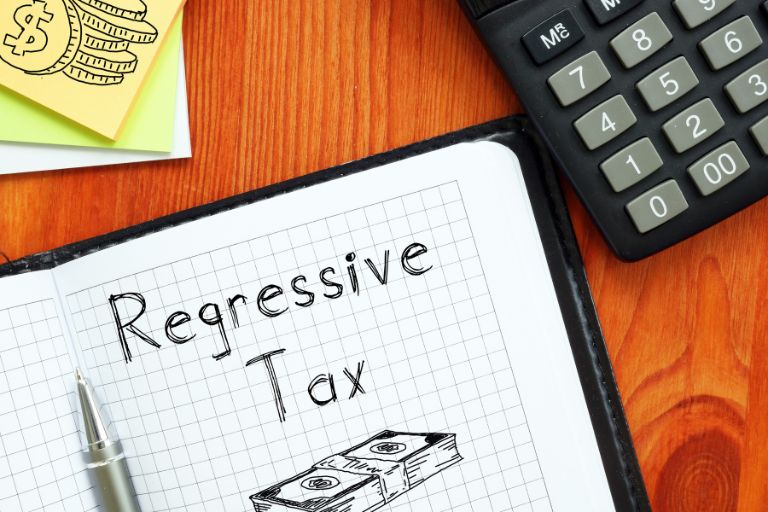Hello there, tax enthusiasts! Buckle up, because we’re about to embark on a wild ride through the thrilling world of regressive tax and tax planning. Yes, you heard it right, thrilling! Because who doesn’t love a good tax joke? Now, let’s dive into the riveting realm of regressive tax, shall we?
Regressive tax, contrary to its name, is not a tax that has failed to progress in life. It’s actually a type of tax that takes a larger percentage from low-income earners than from high-income earners. Sounds unfair, right? Well, hold on to your calculators, because we’re just getting started.
Understanding Regressive Tax
Imagine you’re at a party, and the host announces that everyone has to give up a percentage of their dessert. The catch? The less dessert you have, the more you have to give up. That’s regressive tax for you, always taking the cake… literally.
Regressive tax is like that friend who always insists on splitting the bill equally, even though they ordered the lobster and you just had a salad. It’s a tax that hits the little guy harder, and it’s as popular as a skunk at a garden party.
The Mechanics of Regressive Tax
Regressive tax works on a simple principle: the more you earn, the less you pay (as a percentage of your income). It’s like a reverse Robin Hood, taking from the poor and giving to the rich. It’s a bit like a game of Monopoly where the person with the least money has to pay the most rent.
Common examples of regressive taxes include sales taxes, user fees, and, most controversially, the lottery. Yes, even your dreams of winning big are taxed regressively
Why Regressive Tax?
Now you might be wondering, “Why on earth would anyone implement a regressive tax?” Well, it’s not because they’re evil overlords (or maybe they are, who knows?). The argument for regressive tax is that it’s simple and easy to administer. Plus, it’s a reliable source of revenue, because let’s face it, the poor aren’t going anywhere.
Another argument for regressive tax is that it encourages people to earn more. After all, the more you earn, the less you pay (as a percentage). It’s like a twisted version of a motivational poster: “Work harder, pay less tax!”
Tax Planning and Regressive Tax
Now that we’ve covered the basics of regressive tax, let’s move on to the exciting world of tax planning. Tax planning is like a game of chess, where the king is your income and the pawns are your deductions. The goal is to protect your king while sacrificing as few pawns as possible.
</p><img alt=”Section Image” src=”https://images.byword.ai/rbCO3Y6F6lrRE19SGU9xwei4WCyRLfINzjiXWyauypYZVbaSA-out-0.png” style=”max-width:600px; width: 100%;”/>

When it comes to regressive tax, tax planning can be a bit tricky. It’s like trying to navigate a maze while blindfolded and riding a unicycle. But don’t worry, we’ve got some tips and tricks to help you out.
Understanding Your Tax Burden
Before you can plan for taxes, you need to understand your tax burden. This is like knowing how much weight you can lift before you start bench pressing. In the world of regressive tax, your tax burden is determined by your income and the tax rate.
Once you know your tax burden, you can start planning. This might involve finding ways to increase your income (because remember, the more you earn, the less you pay as a percentage), or finding deductions that can reduce your taxable income.
Strategies for Minimizing Regressive Tax
Now, let’s talk about strategies for minimizing regressive tax. This is where the fun really starts! It’s like a game of hide and seek, where you’re trying to hide your income from the tax collector.
One strategy is to increase your income. This might sound counterintuitive, but remember, the more you earn, the less you pay as a percentage. So, get out there and start earning!
Another strategy is to find deductions. This is like finding hidden treasure in the tax code. Deductions can reduce your taxable income, which can help reduce your tax burden.
Conclusion
And there you have it, folks! A whirlwind tour of the exhilarating world of regressive tax and tax planning. We’ve laughed, we’ve cried, we’ve learned about taxes. What more could you ask for?
Remember, tax planning is a game, and like any game, it can be won or lost. So, arm yourself with knowledge, strategize wisely, and may the odds be ever in your favor. Until next time, happy tax planning!


